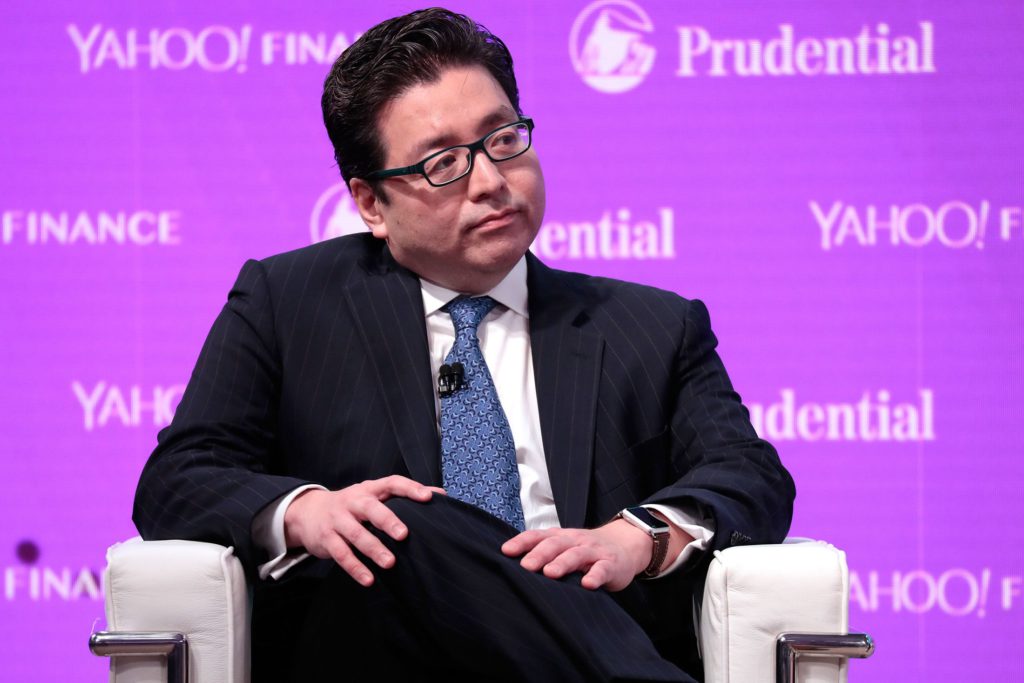(Bloomberg) — Hype over a yet-to-be-launched U.S. exchange-traded fund based on Bitcoin futures is so great it could attract more than $50 billion in inflows in its first year, according to noted Bitcoin bull Tom Lee.
“We think Bitcoin demand will exceed the inflows for QQQ,” Lee, co-founder of Fundstrat Global Advisors, wrote in a note Monday. Lee was referring to ETF giant Invesco QQQ Trust Series 1 fund, which tracks the benchmark Nasdaq 100 equity index. That two-decade-old fund has more than $188 billion in assets and ranks as the fifth-largest ETF, according to data compiled by Bloomberg.
Lee’s team has a year-end $100,000 price target on Bitcoin — though he says the coin’s price could conceivably rise to $168,000.
Bitcoin has more than doubled since the start of the year, though the ride has been uneasy as the market confronts narratives from increasing institutional adoption and greater asset-class maturity to a crypto crackdown in China and concerns about energy usage. The latest leg higher comes as ETF issuer ProShares prepares to launch its Bitcoin futures fund on the New York Stock Exchange Tuesday, a move that would end an eight-year wait for a security tracking the cryptocurrency on the U.S. stock market. The fund company likely won’t meet with any resistance from the Securities and Exchange Commission, Bloomberg reported last week.
Any launch will be closely watched and market watchers have a few measuring sticks with which to gauge the initial reception. The SPDR Gold Shares fund, ticker GLD, had the fastest-ever climb to $1 billion in assets under management, reaching the landmark in just three days, according to Bloomberg Intelligence. More recently, the VanEck Social Sentiment fund, ticker BUZZ, saw more than $400 million worth of shares traded on its debut earlier this year, one of the highest amounts ever for an ETF on its first day.
To be sure, any Bitcoin-futures based ETF will have a lot of competition. At the start of October, there were 12 filings for futures-based ETFs in front of the SEC. Ten of them are filed under the 1940 act, which the SEC has suggested it favors, while two others are under the 1933 act, according to James Seyffart at Bloomberg Intelligence. One other, filed under the 1940 act, proposes to hold a combination of crypto equities and Bitcoin futures.
Investors also have access to Bitcoin itself through exchanges such as Coinbase Global Inc., so the new ETFs won’t be the only way to gain exposure to the cryptocurrency.
“It definitely opens up adoption and investment to brokerage accounts and IRAs and a set of customers that maybe wouldn’t otherwise purchase Bitcoin,” Juthica Chou, head of OTC options trading at Kraken, said on Bloomberg’s “QuickTake Stock” broadcast Monday. “But it has been my view that especially over the last, call it, couple of years, as compared to 2016, 2017, crypto, Bitcoin onboarding, it’s very easy for the average investor to get access to Bitcoin, to custody Bitcoin with exchanges that are in good standing. So I think the impact there would be somewhat reduced.”
Still, with cryptocurrencies making up about 1% of all allocated liquid assets, a new Bitcoin futures-based fund will enable “vastly more individuals to allocate to crypto. This will drive significant new inflows,” Lee wrote Monday. That may help pave the way for further gains.
Bitcoin rose as much as 5.5% Monday to trade around $62,667.
More stories like this are available on bloomberg.com
©2021 Bloomberg L.P.











